Factors Influencing Online Shopping in Australia: Research Proposal
VerifiedAdded on 2022/11/13
|20
|4486
|337
Project
AI Summary
This research proposal investigates the factors influencing consumer attitudes towards online shopping in Australia. It examines the impact of convenience, trust, experience, and price on consumer behavior and purchase intentions. The study aims to identify the relationship between consumer attitudes and online shopping, as well as the key factors that influence these attitudes. The research includes a conceptual framework outlining the variables and hypotheses, followed by a detailed methodology, project budget, and schedule. The proposal highlights the importance of understanding consumer behavior for businesses in the online retail market, and the potential benefits of this research for both academics and practitioners. The study uses a survey-based approach to assess consumer perceptions and preferences, and the findings are expected to provide valuable insights for online retailers seeking to improve their strategies and attract more customers. The proposal also addresses the limitations of the study and suggests areas for future research. The study's justification lies in the increasing importance of online shopping and the need to understand consumer attitudes in order to drive business revenue and growth in the digital marketplace. The study includes an examination of the relationship between consumer attitudes, online shopping intentions, and the factors that influence consumer attitudes, such as convenience, trust, experience, and price.
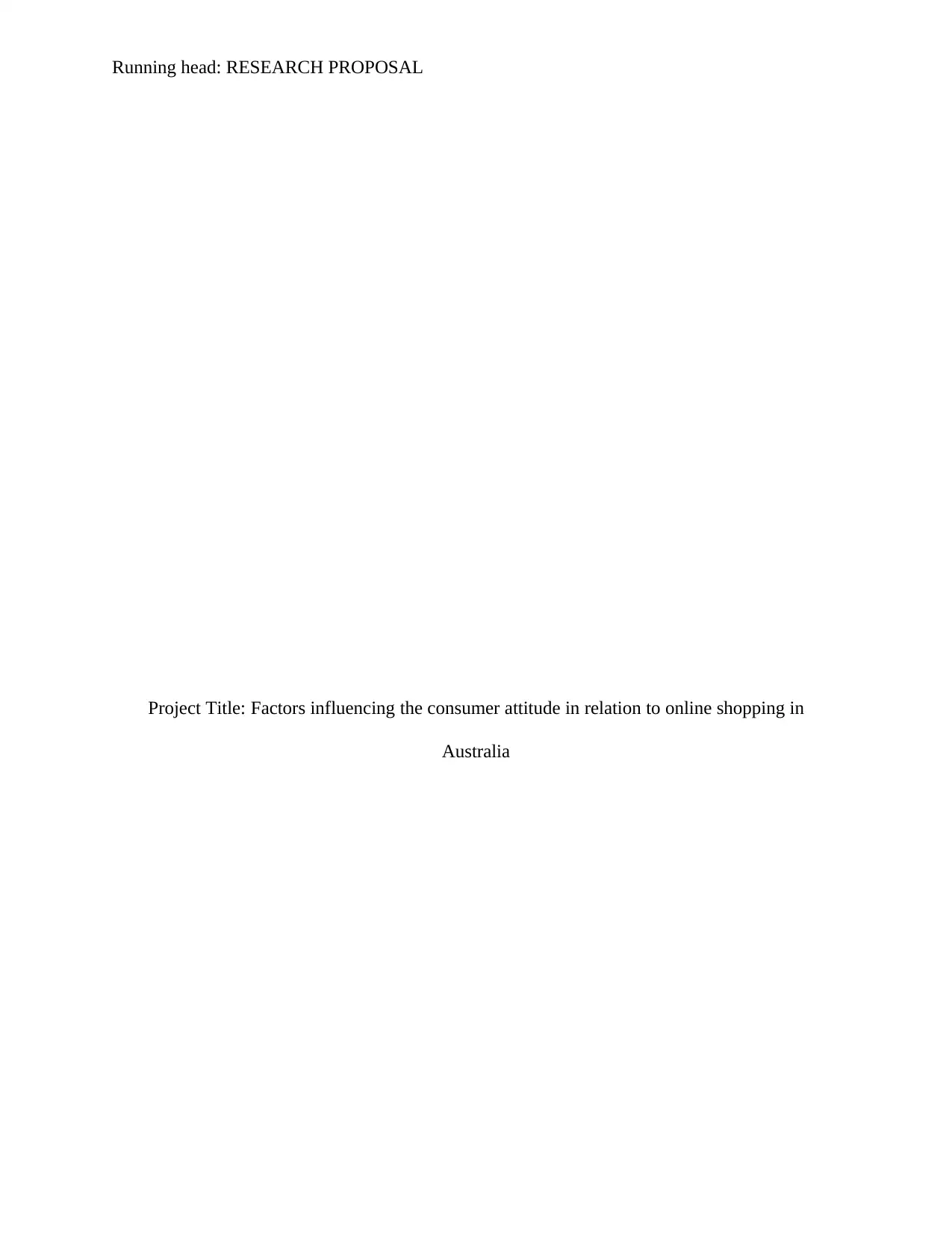
Running head: RESEARCH PROPOSAL
Project Title: Factors influencing the consumer attitude in relation to online shopping in
Australia
Project Title: Factors influencing the consumer attitude in relation to online shopping in
Australia
Paraphrase This Document
Need a fresh take? Get an instant paraphrase of this document with our AI Paraphraser
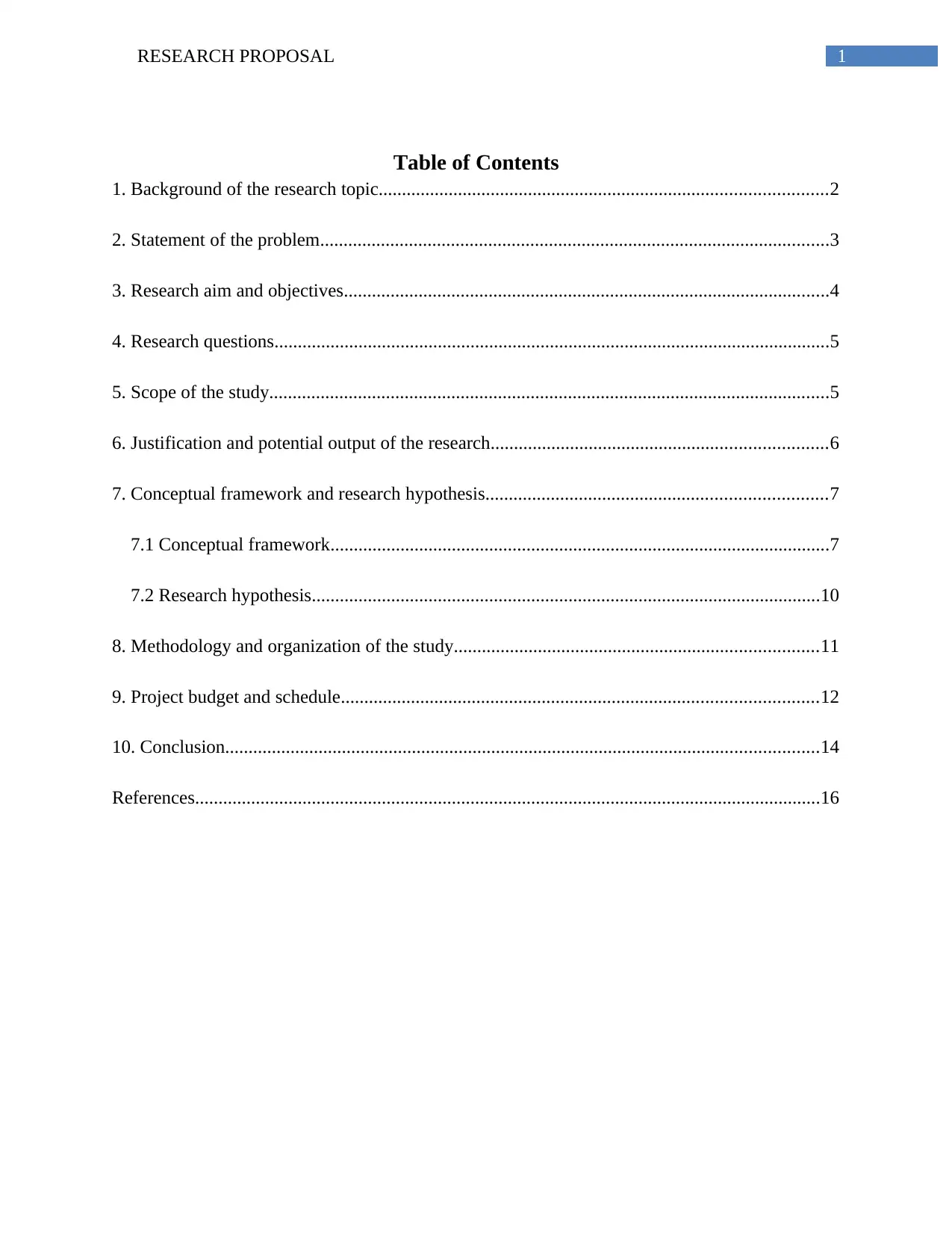
1RESEARCH PROPOSAL
Table of Contents
1. Background of the research topic................................................................................................2
2. Statement of the problem.............................................................................................................3
3. Research aim and objectives........................................................................................................4
4. Research questions.......................................................................................................................5
5. Scope of the study........................................................................................................................5
6. Justification and potential output of the research........................................................................6
7. Conceptual framework and research hypothesis.........................................................................7
7.1 Conceptual framework...........................................................................................................7
7.2 Research hypothesis.............................................................................................................10
8. Methodology and organization of the study..............................................................................11
9. Project budget and schedule......................................................................................................12
10. Conclusion...............................................................................................................................14
References......................................................................................................................................16
Table of Contents
1. Background of the research topic................................................................................................2
2. Statement of the problem.............................................................................................................3
3. Research aim and objectives........................................................................................................4
4. Research questions.......................................................................................................................5
5. Scope of the study........................................................................................................................5
6. Justification and potential output of the research........................................................................6
7. Conceptual framework and research hypothesis.........................................................................7
7.1 Conceptual framework...........................................................................................................7
7.2 Research hypothesis.............................................................................................................10
8. Methodology and organization of the study..............................................................................11
9. Project budget and schedule......................................................................................................12
10. Conclusion...............................................................................................................................14
References......................................................................................................................................16
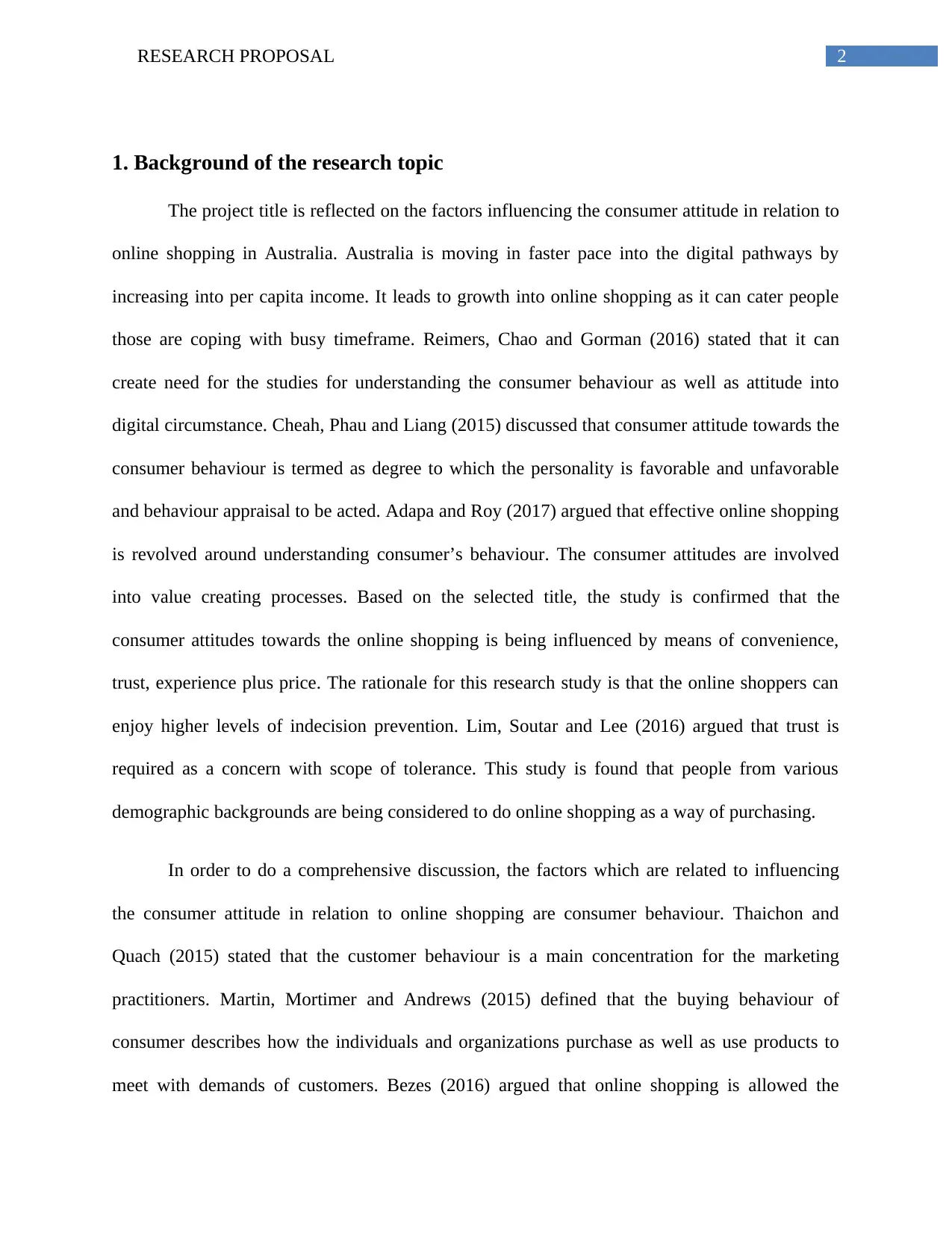
2RESEARCH PROPOSAL
1. Background of the research topic
The project title is reflected on the factors influencing the consumer attitude in relation to
online shopping in Australia. Australia is moving in faster pace into the digital pathways by
increasing into per capita income. It leads to growth into online shopping as it can cater people
those are coping with busy timeframe. Reimers, Chao and Gorman (2016) stated that it can
create need for the studies for understanding the consumer behaviour as well as attitude into
digital circumstance. Cheah, Phau and Liang (2015) discussed that consumer attitude towards the
consumer behaviour is termed as degree to which the personality is favorable and unfavorable
and behaviour appraisal to be acted. Adapa and Roy (2017) argued that effective online shopping
is revolved around understanding consumer’s behaviour. The consumer attitudes are involved
into value creating processes. Based on the selected title, the study is confirmed that the
consumer attitudes towards the online shopping is being influenced by means of convenience,
trust, experience plus price. The rationale for this research study is that the online shoppers can
enjoy higher levels of indecision prevention. Lim, Soutar and Lee (2016) argued that trust is
required as a concern with scope of tolerance. This study is found that people from various
demographic backgrounds are being considered to do online shopping as a way of purchasing.
In order to do a comprehensive discussion, the factors which are related to influencing
the consumer attitude in relation to online shopping are consumer behaviour. Thaichon and
Quach (2015) stated that the customer behaviour is a main concentration for the marketing
practitioners. Martin, Mortimer and Andrews (2015) defined that the buying behaviour of
consumer describes how the individuals and organizations purchase as well as use products to
meet with demands of customers. Bezes (2016) argued that online shopping is allowed the
1. Background of the research topic
The project title is reflected on the factors influencing the consumer attitude in relation to
online shopping in Australia. Australia is moving in faster pace into the digital pathways by
increasing into per capita income. It leads to growth into online shopping as it can cater people
those are coping with busy timeframe. Reimers, Chao and Gorman (2016) stated that it can
create need for the studies for understanding the consumer behaviour as well as attitude into
digital circumstance. Cheah, Phau and Liang (2015) discussed that consumer attitude towards the
consumer behaviour is termed as degree to which the personality is favorable and unfavorable
and behaviour appraisal to be acted. Adapa and Roy (2017) argued that effective online shopping
is revolved around understanding consumer’s behaviour. The consumer attitudes are involved
into value creating processes. Based on the selected title, the study is confirmed that the
consumer attitudes towards the online shopping is being influenced by means of convenience,
trust, experience plus price. The rationale for this research study is that the online shoppers can
enjoy higher levels of indecision prevention. Lim, Soutar and Lee (2016) argued that trust is
required as a concern with scope of tolerance. This study is found that people from various
demographic backgrounds are being considered to do online shopping as a way of purchasing.
In order to do a comprehensive discussion, the factors which are related to influencing
the consumer attitude in relation to online shopping are consumer behaviour. Thaichon and
Quach (2015) stated that the customer behaviour is a main concentration for the marketing
practitioners. Martin, Mortimer and Andrews (2015) defined that the buying behaviour of
consumer describes how the individuals and organizations purchase as well as use products to
meet with demands of customers. Bezes (2016) argued that online shopping is allowed the
⊘ This is a preview!⊘
Do you want full access?
Subscribe today to unlock all pages.

Trusted by 1+ million students worldwide
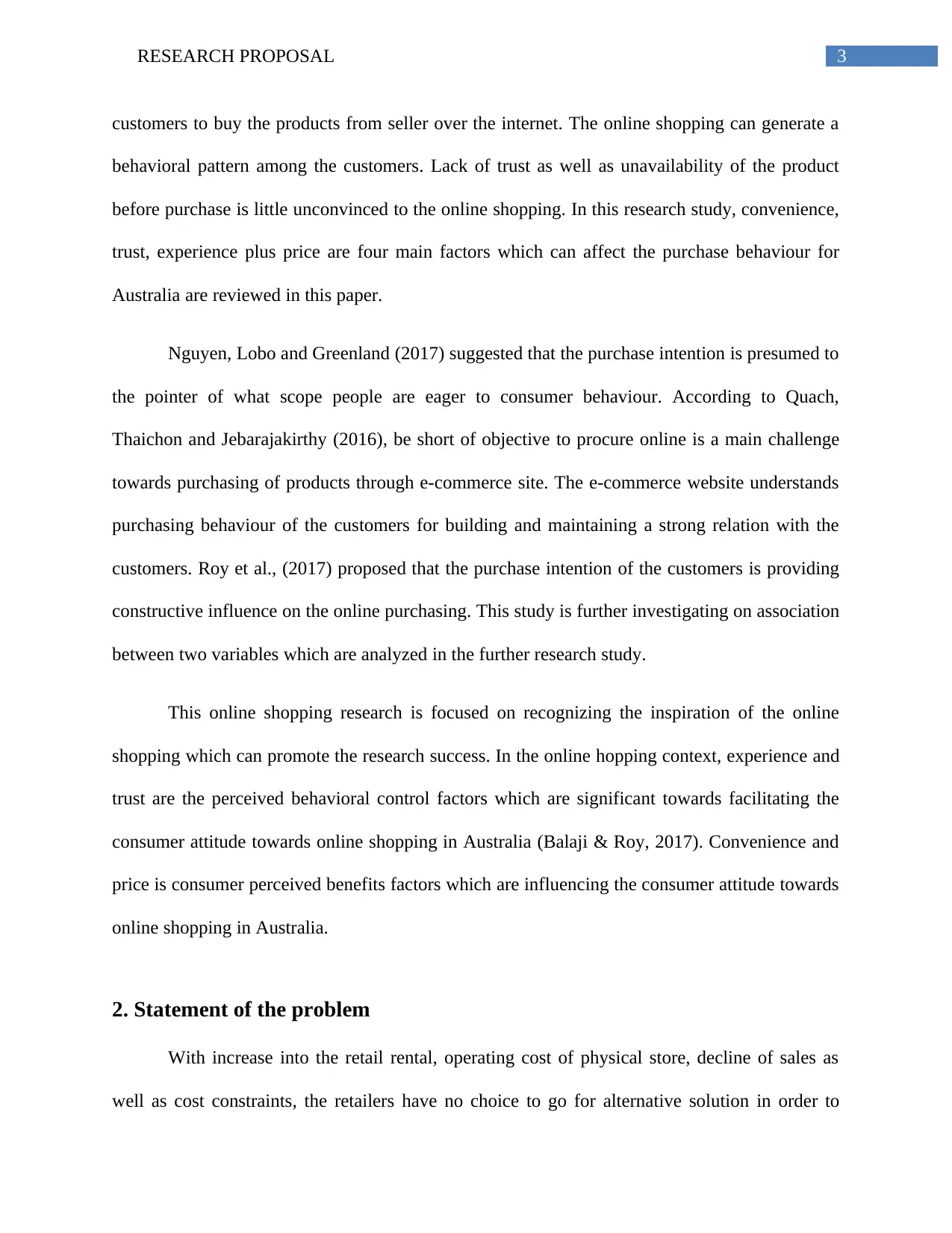
3RESEARCH PROPOSAL
customers to buy the products from seller over the internet. The online shopping can generate a
behavioral pattern among the customers. Lack of trust as well as unavailability of the product
before purchase is little unconvinced to the online shopping. In this research study, convenience,
trust, experience plus price are four main factors which can affect the purchase behaviour for
Australia are reviewed in this paper.
Nguyen, Lobo and Greenland (2017) suggested that the purchase intention is presumed to
the pointer of what scope people are eager to consumer behaviour. According to Quach,
Thaichon and Jebarajakirthy (2016), be short of objective to procure online is a main challenge
towards purchasing of products through e-commerce site. The e-commerce website understands
purchasing behaviour of the customers for building and maintaining a strong relation with the
customers. Roy et al., (2017) proposed that the purchase intention of the customers is providing
constructive influence on the online purchasing. This study is further investigating on association
between two variables which are analyzed in the further research study.
This online shopping research is focused on recognizing the inspiration of the online
shopping which can promote the research success. In the online hopping context, experience and
trust are the perceived behavioral control factors which are significant towards facilitating the
consumer attitude towards online shopping in Australia (Balaji & Roy, 2017). Convenience and
price is consumer perceived benefits factors which are influencing the consumer attitude towards
online shopping in Australia.
2. Statement of the problem
With increase into the retail rental, operating cost of physical store, decline of sales as
well as cost constraints, the retailers have no choice to go for alternative solution in order to
customers to buy the products from seller over the internet. The online shopping can generate a
behavioral pattern among the customers. Lack of trust as well as unavailability of the product
before purchase is little unconvinced to the online shopping. In this research study, convenience,
trust, experience plus price are four main factors which can affect the purchase behaviour for
Australia are reviewed in this paper.
Nguyen, Lobo and Greenland (2017) suggested that the purchase intention is presumed to
the pointer of what scope people are eager to consumer behaviour. According to Quach,
Thaichon and Jebarajakirthy (2016), be short of objective to procure online is a main challenge
towards purchasing of products through e-commerce site. The e-commerce website understands
purchasing behaviour of the customers for building and maintaining a strong relation with the
customers. Roy et al., (2017) proposed that the purchase intention of the customers is providing
constructive influence on the online purchasing. This study is further investigating on association
between two variables which are analyzed in the further research study.
This online shopping research is focused on recognizing the inspiration of the online
shopping which can promote the research success. In the online hopping context, experience and
trust are the perceived behavioral control factors which are significant towards facilitating the
consumer attitude towards online shopping in Australia (Balaji & Roy, 2017). Convenience and
price is consumer perceived benefits factors which are influencing the consumer attitude towards
online shopping in Australia.
2. Statement of the problem
With increase into the retail rental, operating cost of physical store, decline of sales as
well as cost constraints, the retailers have no choice to go for alternative solution in order to
Paraphrase This Document
Need a fresh take? Get an instant paraphrase of this document with our AI Paraphraser
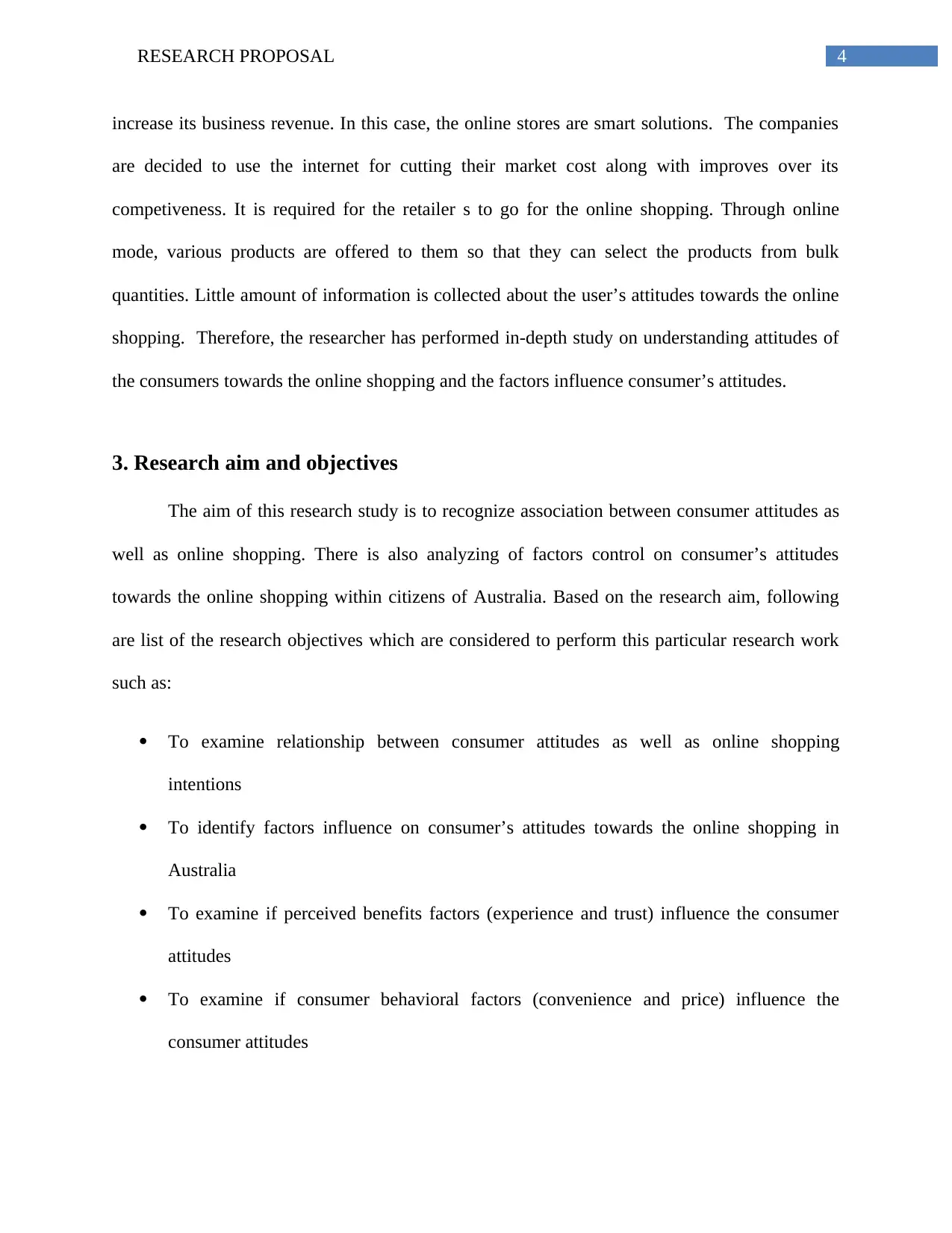
4RESEARCH PROPOSAL
increase its business revenue. In this case, the online stores are smart solutions. The companies
are decided to use the internet for cutting their market cost along with improves over its
competiveness. It is required for the retailer s to go for the online shopping. Through online
mode, various products are offered to them so that they can select the products from bulk
quantities. Little amount of information is collected about the user’s attitudes towards the online
shopping. Therefore, the researcher has performed in-depth study on understanding attitudes of
the consumers towards the online shopping and the factors influence consumer’s attitudes.
3. Research aim and objectives
The aim of this research study is to recognize association between consumer attitudes as
well as online shopping. There is also analyzing of factors control on consumer’s attitudes
towards the online shopping within citizens of Australia. Based on the research aim, following
are list of the research objectives which are considered to perform this particular research work
such as:
To examine relationship between consumer attitudes as well as online shopping
intentions
To identify factors influence on consumer’s attitudes towards the online shopping in
Australia
To examine if perceived benefits factors (experience and trust) influence the consumer
attitudes
To examine if consumer behavioral factors (convenience and price) influence the
consumer attitudes
increase its business revenue. In this case, the online stores are smart solutions. The companies
are decided to use the internet for cutting their market cost along with improves over its
competiveness. It is required for the retailer s to go for the online shopping. Through online
mode, various products are offered to them so that they can select the products from bulk
quantities. Little amount of information is collected about the user’s attitudes towards the online
shopping. Therefore, the researcher has performed in-depth study on understanding attitudes of
the consumers towards the online shopping and the factors influence consumer’s attitudes.
3. Research aim and objectives
The aim of this research study is to recognize association between consumer attitudes as
well as online shopping. There is also analyzing of factors control on consumer’s attitudes
towards the online shopping within citizens of Australia. Based on the research aim, following
are list of the research objectives which are considered to perform this particular research work
such as:
To examine relationship between consumer attitudes as well as online shopping
intentions
To identify factors influence on consumer’s attitudes towards the online shopping in
Australia
To examine if perceived benefits factors (experience and trust) influence the consumer
attitudes
To examine if consumer behavioral factors (convenience and price) influence the
consumer attitudes
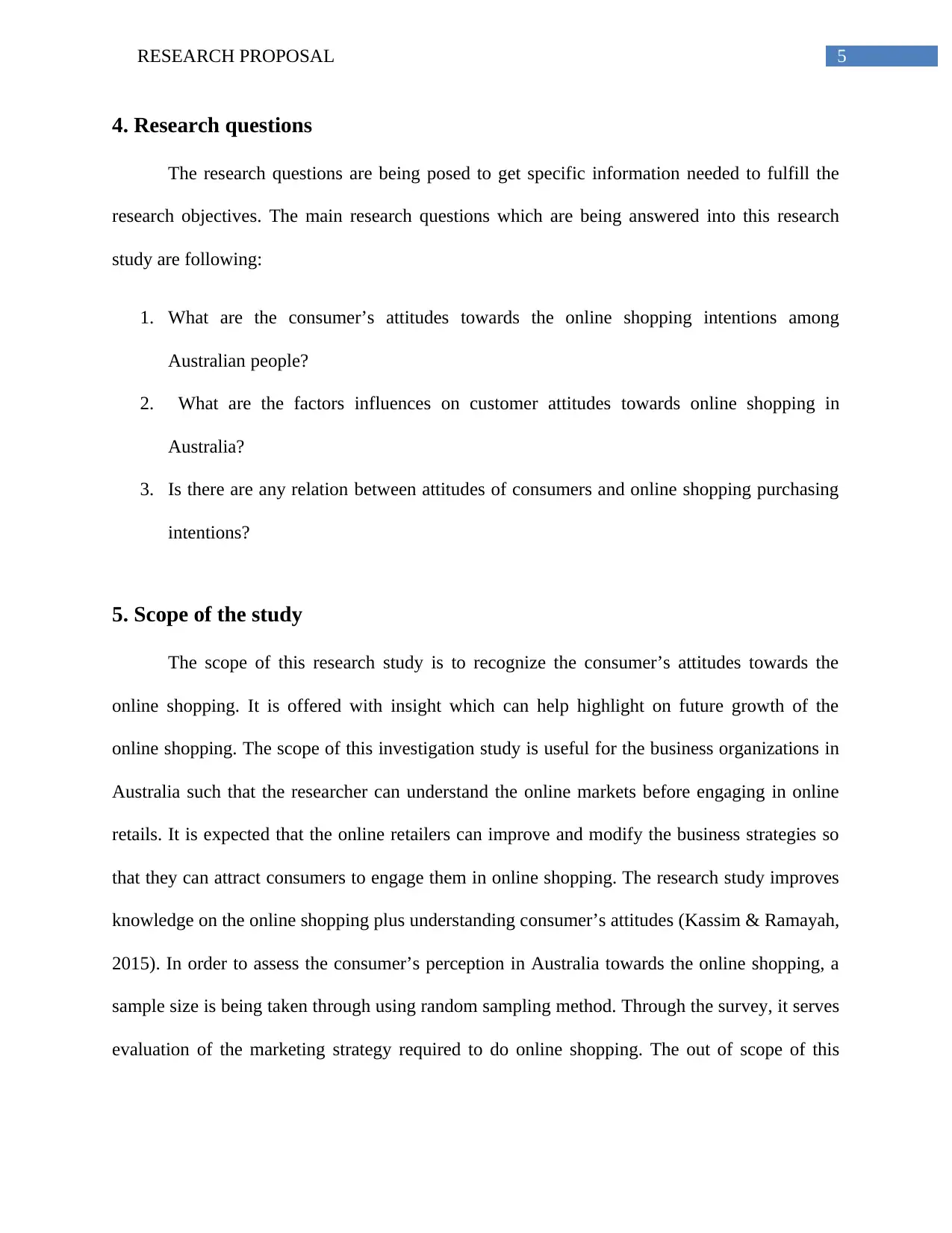
5RESEARCH PROPOSAL
4. Research questions
The research questions are being posed to get specific information needed to fulfill the
research objectives. The main research questions which are being answered into this research
study are following:
1. What are the consumer’s attitudes towards the online shopping intentions among
Australian people?
2. What are the factors influences on customer attitudes towards online shopping in
Australia?
3. Is there are any relation between attitudes of consumers and online shopping purchasing
intentions?
5. Scope of the study
The scope of this research study is to recognize the consumer’s attitudes towards the
online shopping. It is offered with insight which can help highlight on future growth of the
online shopping. The scope of this investigation study is useful for the business organizations in
Australia such that the researcher can understand the online markets before engaging in online
retails. It is expected that the online retailers can improve and modify the business strategies so
that they can attract consumers to engage them in online shopping. The research study improves
knowledge on the online shopping plus understanding consumer’s attitudes (Kassim & Ramayah,
2015). In order to assess the consumer’s perception in Australia towards the online shopping, a
sample size is being taken through using random sampling method. Through the survey, it serves
evaluation of the marketing strategy required to do online shopping. The out of scope of this
4. Research questions
The research questions are being posed to get specific information needed to fulfill the
research objectives. The main research questions which are being answered into this research
study are following:
1. What are the consumer’s attitudes towards the online shopping intentions among
Australian people?
2. What are the factors influences on customer attitudes towards online shopping in
Australia?
3. Is there are any relation between attitudes of consumers and online shopping purchasing
intentions?
5. Scope of the study
The scope of this research study is to recognize the consumer’s attitudes towards the
online shopping. It is offered with insight which can help highlight on future growth of the
online shopping. The scope of this investigation study is useful for the business organizations in
Australia such that the researcher can understand the online markets before engaging in online
retails. It is expected that the online retailers can improve and modify the business strategies so
that they can attract consumers to engage them in online shopping. The research study improves
knowledge on the online shopping plus understanding consumer’s attitudes (Kassim & Ramayah,
2015). In order to assess the consumer’s perception in Australia towards the online shopping, a
sample size is being taken through using random sampling method. Through the survey, it serves
evaluation of the marketing strategy required to do online shopping. The out of scope of this
⊘ This is a preview!⊘
Do you want full access?
Subscribe today to unlock all pages.

Trusted by 1+ million students worldwide
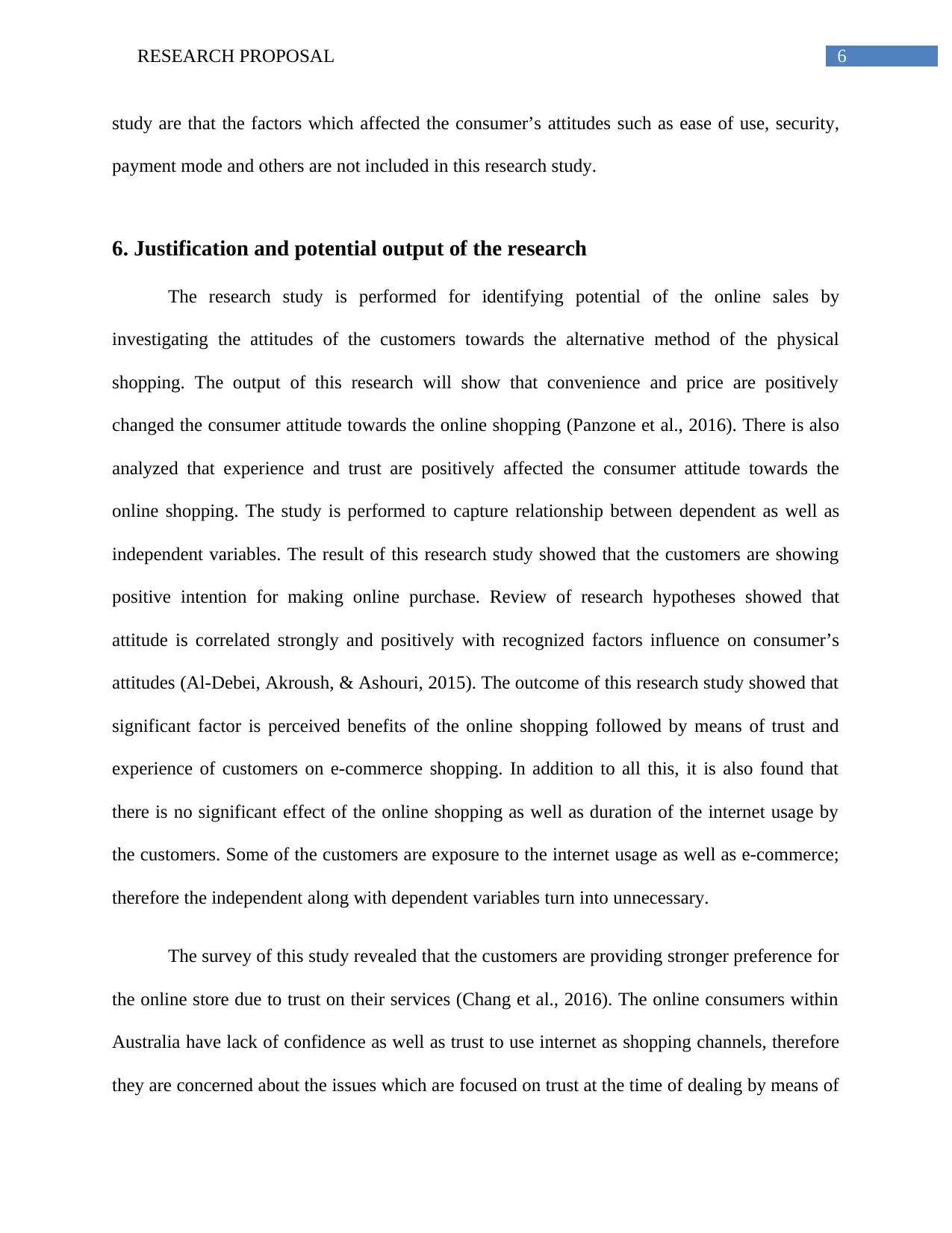
6RESEARCH PROPOSAL
study are that the factors which affected the consumer’s attitudes such as ease of use, security,
payment mode and others are not included in this research study.
6. Justification and potential output of the research
The research study is performed for identifying potential of the online sales by
investigating the attitudes of the customers towards the alternative method of the physical
shopping. The output of this research will show that convenience and price are positively
changed the consumer attitude towards the online shopping (Panzone et al., 2016). There is also
analyzed that experience and trust are positively affected the consumer attitude towards the
online shopping. The study is performed to capture relationship between dependent as well as
independent variables. The result of this research study showed that the customers are showing
positive intention for making online purchase. Review of research hypotheses showed that
attitude is correlated strongly and positively with recognized factors influence on consumer’s
attitudes (Al-Debei, Akroush, & Ashouri, 2015). The outcome of this research study showed that
significant factor is perceived benefits of the online shopping followed by means of trust and
experience of customers on e-commerce shopping. In addition to all this, it is also found that
there is no significant effect of the online shopping as well as duration of the internet usage by
the customers. Some of the customers are exposure to the internet usage as well as e-commerce;
therefore the independent along with dependent variables turn into unnecessary.
The survey of this study revealed that the customers are providing stronger preference for
the online store due to trust on their services (Chang et al., 2016). The online consumers within
Australia have lack of confidence as well as trust to use internet as shopping channels, therefore
they are concerned about the issues which are focused on trust at the time of dealing by means of
study are that the factors which affected the consumer’s attitudes such as ease of use, security,
payment mode and others are not included in this research study.
6. Justification and potential output of the research
The research study is performed for identifying potential of the online sales by
investigating the attitudes of the customers towards the alternative method of the physical
shopping. The output of this research will show that convenience and price are positively
changed the consumer attitude towards the online shopping (Panzone et al., 2016). There is also
analyzed that experience and trust are positively affected the consumer attitude towards the
online shopping. The study is performed to capture relationship between dependent as well as
independent variables. The result of this research study showed that the customers are showing
positive intention for making online purchase. Review of research hypotheses showed that
attitude is correlated strongly and positively with recognized factors influence on consumer’s
attitudes (Al-Debei, Akroush, & Ashouri, 2015). The outcome of this research study showed that
significant factor is perceived benefits of the online shopping followed by means of trust and
experience of customers on e-commerce shopping. In addition to all this, it is also found that
there is no significant effect of the online shopping as well as duration of the internet usage by
the customers. Some of the customers are exposure to the internet usage as well as e-commerce;
therefore the independent along with dependent variables turn into unnecessary.
The survey of this study revealed that the customers are providing stronger preference for
the online store due to trust on their services (Chang et al., 2016). The online consumers within
Australia have lack of confidence as well as trust to use internet as shopping channels, therefore
they are concerned about the issues which are focused on trust at the time of dealing by means of
Paraphrase This Document
Need a fresh take? Get an instant paraphrase of this document with our AI Paraphraser
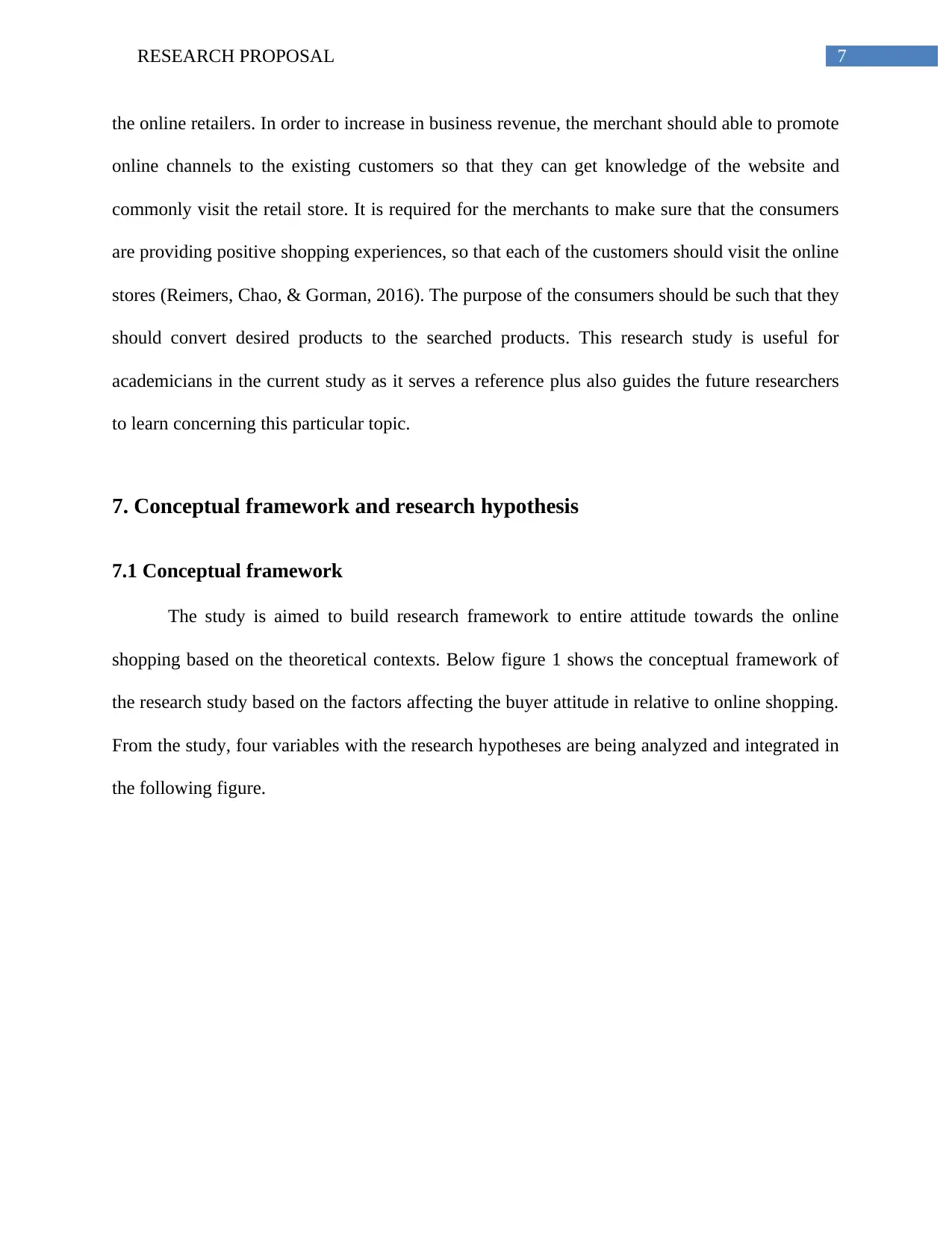
7RESEARCH PROPOSAL
the online retailers. In order to increase in business revenue, the merchant should able to promote
online channels to the existing customers so that they can get knowledge of the website and
commonly visit the retail store. It is required for the merchants to make sure that the consumers
are providing positive shopping experiences, so that each of the customers should visit the online
stores (Reimers, Chao, & Gorman, 2016). The purpose of the consumers should be such that they
should convert desired products to the searched products. This research study is useful for
academicians in the current study as it serves a reference plus also guides the future researchers
to learn concerning this particular topic.
7. Conceptual framework and research hypothesis
7.1 Conceptual framework
The study is aimed to build research framework to entire attitude towards the online
shopping based on the theoretical contexts. Below figure 1 shows the conceptual framework of
the research study based on the factors affecting the buyer attitude in relative to online shopping.
From the study, four variables with the research hypotheses are being analyzed and integrated in
the following figure.
the online retailers. In order to increase in business revenue, the merchant should able to promote
online channels to the existing customers so that they can get knowledge of the website and
commonly visit the retail store. It is required for the merchants to make sure that the consumers
are providing positive shopping experiences, so that each of the customers should visit the online
stores (Reimers, Chao, & Gorman, 2016). The purpose of the consumers should be such that they
should convert desired products to the searched products. This research study is useful for
academicians in the current study as it serves a reference plus also guides the future researchers
to learn concerning this particular topic.
7. Conceptual framework and research hypothesis
7.1 Conceptual framework
The study is aimed to build research framework to entire attitude towards the online
shopping based on the theoretical contexts. Below figure 1 shows the conceptual framework of
the research study based on the factors affecting the buyer attitude in relative to online shopping.
From the study, four variables with the research hypotheses are being analyzed and integrated in
the following figure.
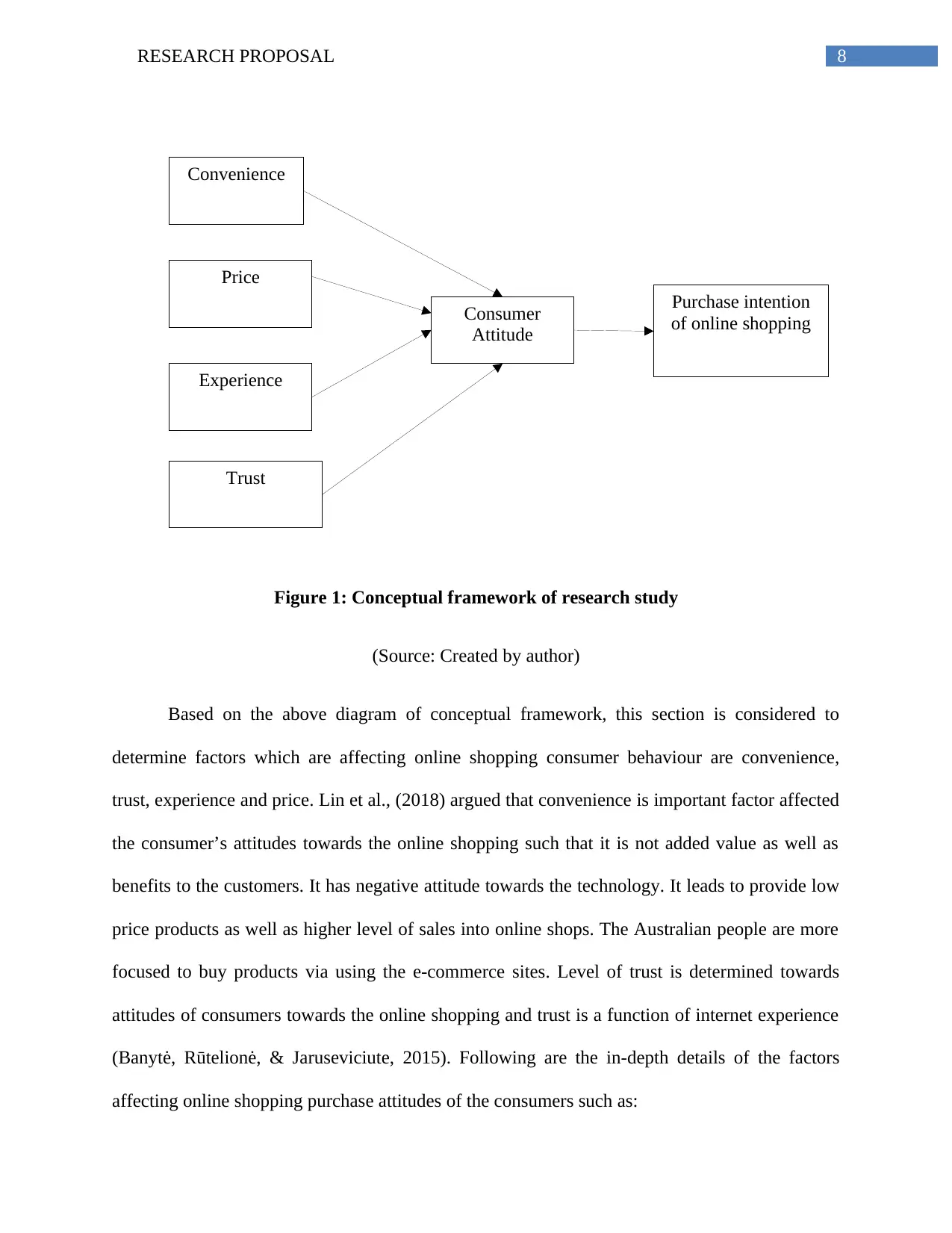
8RESEARCH PROPOSAL
Convenience
Price
Experience
Trust
Consumer
Attitude
Purchase intention
of online shopping
Figure 1: Conceptual framework of research study
(Source: Created by author)
Based on the above diagram of conceptual framework, this section is considered to
determine factors which are affecting online shopping consumer behaviour are convenience,
trust, experience and price. Lin et al., (2018) argued that convenience is important factor affected
the consumer’s attitudes towards the online shopping such that it is not added value as well as
benefits to the customers. It has negative attitude towards the technology. It leads to provide low
price products as well as higher level of sales into online shops. The Australian people are more
focused to buy products via using the e-commerce sites. Level of trust is determined towards
attitudes of consumers towards the online shopping and trust is a function of internet experience
(Banytė, Rūtelionė, & Jaruseviciute, 2015). Following are the in-depth details of the factors
affecting online shopping purchase attitudes of the consumers such as:
Convenience
Price
Experience
Trust
Consumer
Attitude
Purchase intention
of online shopping
Figure 1: Conceptual framework of research study
(Source: Created by author)
Based on the above diagram of conceptual framework, this section is considered to
determine factors which are affecting online shopping consumer behaviour are convenience,
trust, experience and price. Lin et al., (2018) argued that convenience is important factor affected
the consumer’s attitudes towards the online shopping such that it is not added value as well as
benefits to the customers. It has negative attitude towards the technology. It leads to provide low
price products as well as higher level of sales into online shops. The Australian people are more
focused to buy products via using the e-commerce sites. Level of trust is determined towards
attitudes of consumers towards the online shopping and trust is a function of internet experience
(Banytė, Rūtelionė, & Jaruseviciute, 2015). Following are the in-depth details of the factors
affecting online shopping purchase attitudes of the consumers such as:
⊘ This is a preview!⊘
Do you want full access?
Subscribe today to unlock all pages.

Trusted by 1+ million students worldwide
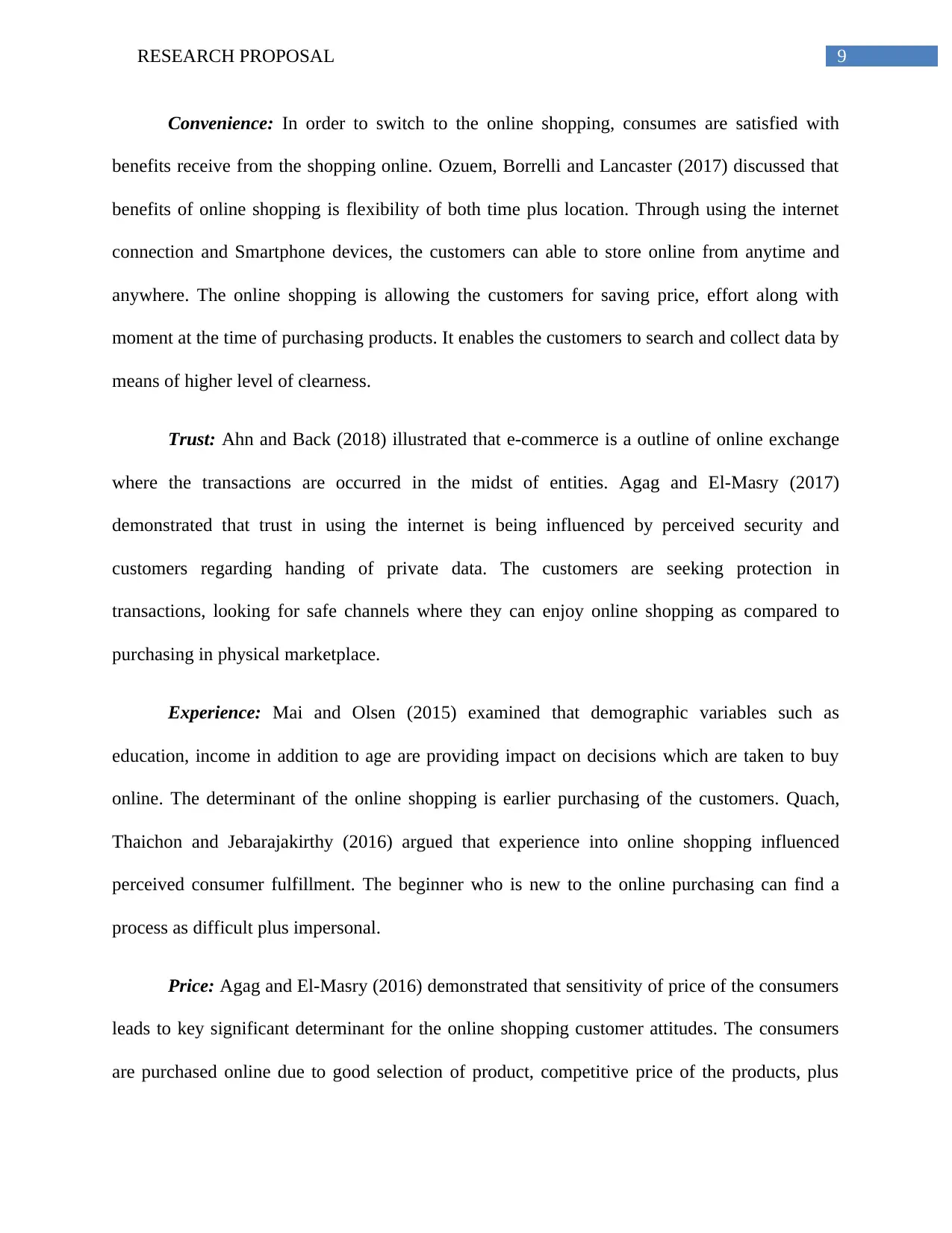
9RESEARCH PROPOSAL
Convenience: In order to switch to the online shopping, consumes are satisfied with
benefits receive from the shopping online. Ozuem, Borrelli and Lancaster (2017) discussed that
benefits of online shopping is flexibility of both time plus location. Through using the internet
connection and Smartphone devices, the customers can able to store online from anytime and
anywhere. The online shopping is allowing the customers for saving price, effort along with
moment at the time of purchasing products. It enables the customers to search and collect data by
means of higher level of clearness.
Trust: Ahn and Back (2018) illustrated that e-commerce is a outline of online exchange
where the transactions are occurred in the midst of entities. Agag and El-Masry (2017)
demonstrated that trust in using the internet is being influenced by perceived security and
customers regarding handing of private data. The customers are seeking protection in
transactions, looking for safe channels where they can enjoy online shopping as compared to
purchasing in physical marketplace.
Experience: Mai and Olsen (2015) examined that demographic variables such as
education, income in addition to age are providing impact on decisions which are taken to buy
online. The determinant of the online shopping is earlier purchasing of the customers. Quach,
Thaichon and Jebarajakirthy (2016) argued that experience into online shopping influenced
perceived consumer fulfillment. The beginner who is new to the online purchasing can find a
process as difficult plus impersonal.
Price: Agag and El-Masry (2016) demonstrated that sensitivity of price of the consumers
leads to key significant determinant for the online shopping customer attitudes. The consumers
are purchased online due to good selection of product, competitive price of the products, plus
Convenience: In order to switch to the online shopping, consumes are satisfied with
benefits receive from the shopping online. Ozuem, Borrelli and Lancaster (2017) discussed that
benefits of online shopping is flexibility of both time plus location. Through using the internet
connection and Smartphone devices, the customers can able to store online from anytime and
anywhere. The online shopping is allowing the customers for saving price, effort along with
moment at the time of purchasing products. It enables the customers to search and collect data by
means of higher level of clearness.
Trust: Ahn and Back (2018) illustrated that e-commerce is a outline of online exchange
where the transactions are occurred in the midst of entities. Agag and El-Masry (2017)
demonstrated that trust in using the internet is being influenced by perceived security and
customers regarding handing of private data. The customers are seeking protection in
transactions, looking for safe channels where they can enjoy online shopping as compared to
purchasing in physical marketplace.
Experience: Mai and Olsen (2015) examined that demographic variables such as
education, income in addition to age are providing impact on decisions which are taken to buy
online. The determinant of the online shopping is earlier purchasing of the customers. Quach,
Thaichon and Jebarajakirthy (2016) argued that experience into online shopping influenced
perceived consumer fulfillment. The beginner who is new to the online purchasing can find a
process as difficult plus impersonal.
Price: Agag and El-Masry (2016) demonstrated that sensitivity of price of the consumers
leads to key significant determinant for the online shopping customer attitudes. The consumers
are purchased online due to good selection of product, competitive price of the products, plus
Paraphrase This Document
Need a fresh take? Get an instant paraphrase of this document with our AI Paraphraser
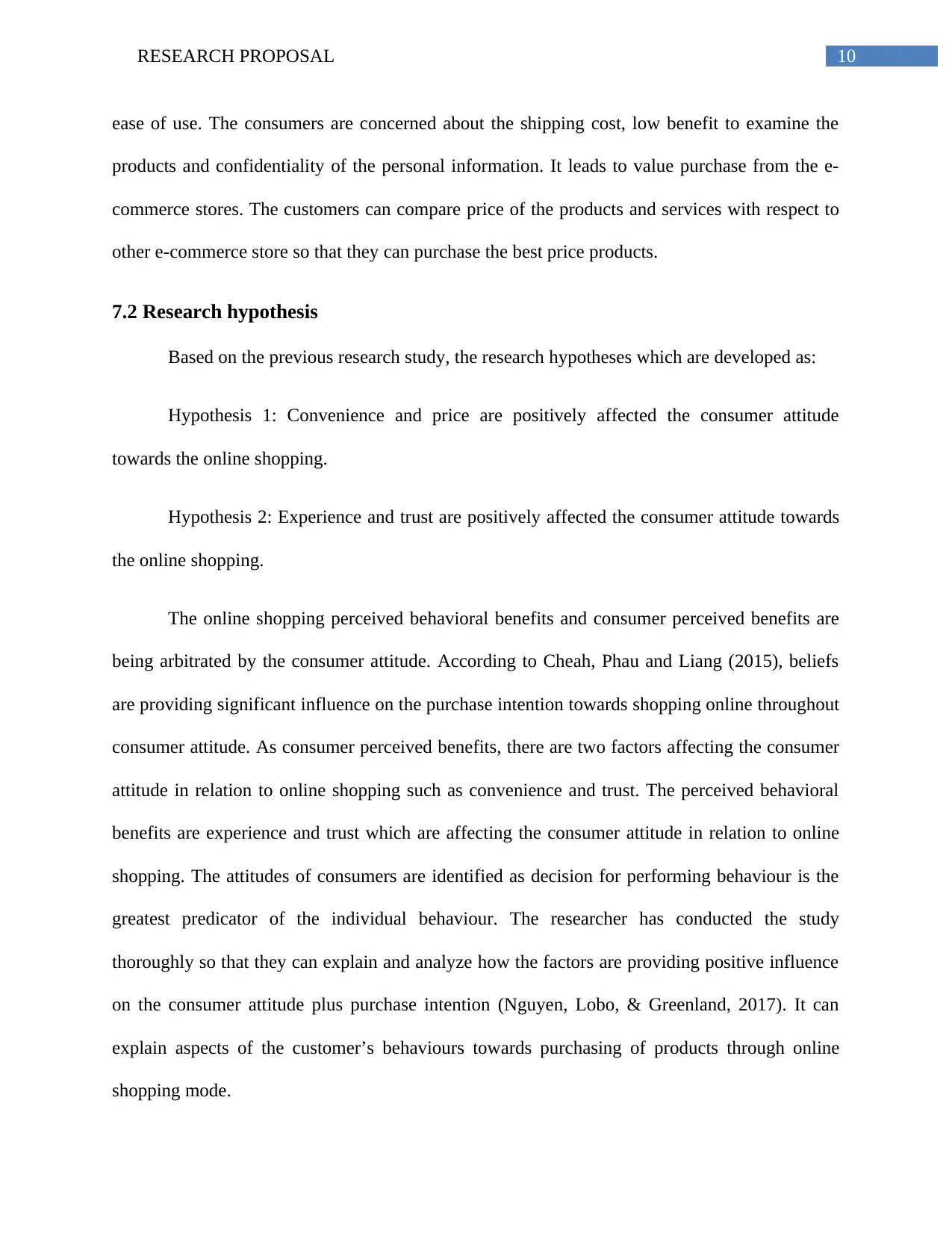
10RESEARCH PROPOSAL
ease of use. The consumers are concerned about the shipping cost, low benefit to examine the
products and confidentiality of the personal information. It leads to value purchase from the e-
commerce stores. The customers can compare price of the products and services with respect to
other e-commerce store so that they can purchase the best price products.
7.2 Research hypothesis
Based on the previous research study, the research hypotheses which are developed as:
Hypothesis 1: Convenience and price are positively affected the consumer attitude
towards the online shopping.
Hypothesis 2: Experience and trust are positively affected the consumer attitude towards
the online shopping.
The online shopping perceived behavioral benefits and consumer perceived benefits are
being arbitrated by the consumer attitude. According to Cheah, Phau and Liang (2015), beliefs
are providing significant influence on the purchase intention towards shopping online throughout
consumer attitude. As consumer perceived benefits, there are two factors affecting the consumer
attitude in relation to online shopping such as convenience and trust. The perceived behavioral
benefits are experience and trust which are affecting the consumer attitude in relation to online
shopping. The attitudes of consumers are identified as decision for performing behaviour is the
greatest predicator of the individual behaviour. The researcher has conducted the study
thoroughly so that they can explain and analyze how the factors are providing positive influence
on the consumer attitude plus purchase intention (Nguyen, Lobo, & Greenland, 2017). It can
explain aspects of the customer’s behaviours towards purchasing of products through online
shopping mode.
ease of use. The consumers are concerned about the shipping cost, low benefit to examine the
products and confidentiality of the personal information. It leads to value purchase from the e-
commerce stores. The customers can compare price of the products and services with respect to
other e-commerce store so that they can purchase the best price products.
7.2 Research hypothesis
Based on the previous research study, the research hypotheses which are developed as:
Hypothesis 1: Convenience and price are positively affected the consumer attitude
towards the online shopping.
Hypothesis 2: Experience and trust are positively affected the consumer attitude towards
the online shopping.
The online shopping perceived behavioral benefits and consumer perceived benefits are
being arbitrated by the consumer attitude. According to Cheah, Phau and Liang (2015), beliefs
are providing significant influence on the purchase intention towards shopping online throughout
consumer attitude. As consumer perceived benefits, there are two factors affecting the consumer
attitude in relation to online shopping such as convenience and trust. The perceived behavioral
benefits are experience and trust which are affecting the consumer attitude in relation to online
shopping. The attitudes of consumers are identified as decision for performing behaviour is the
greatest predicator of the individual behaviour. The researcher has conducted the study
thoroughly so that they can explain and analyze how the factors are providing positive influence
on the consumer attitude plus purchase intention (Nguyen, Lobo, & Greenland, 2017). It can
explain aspects of the customer’s behaviours towards purchasing of products through online
shopping mode.
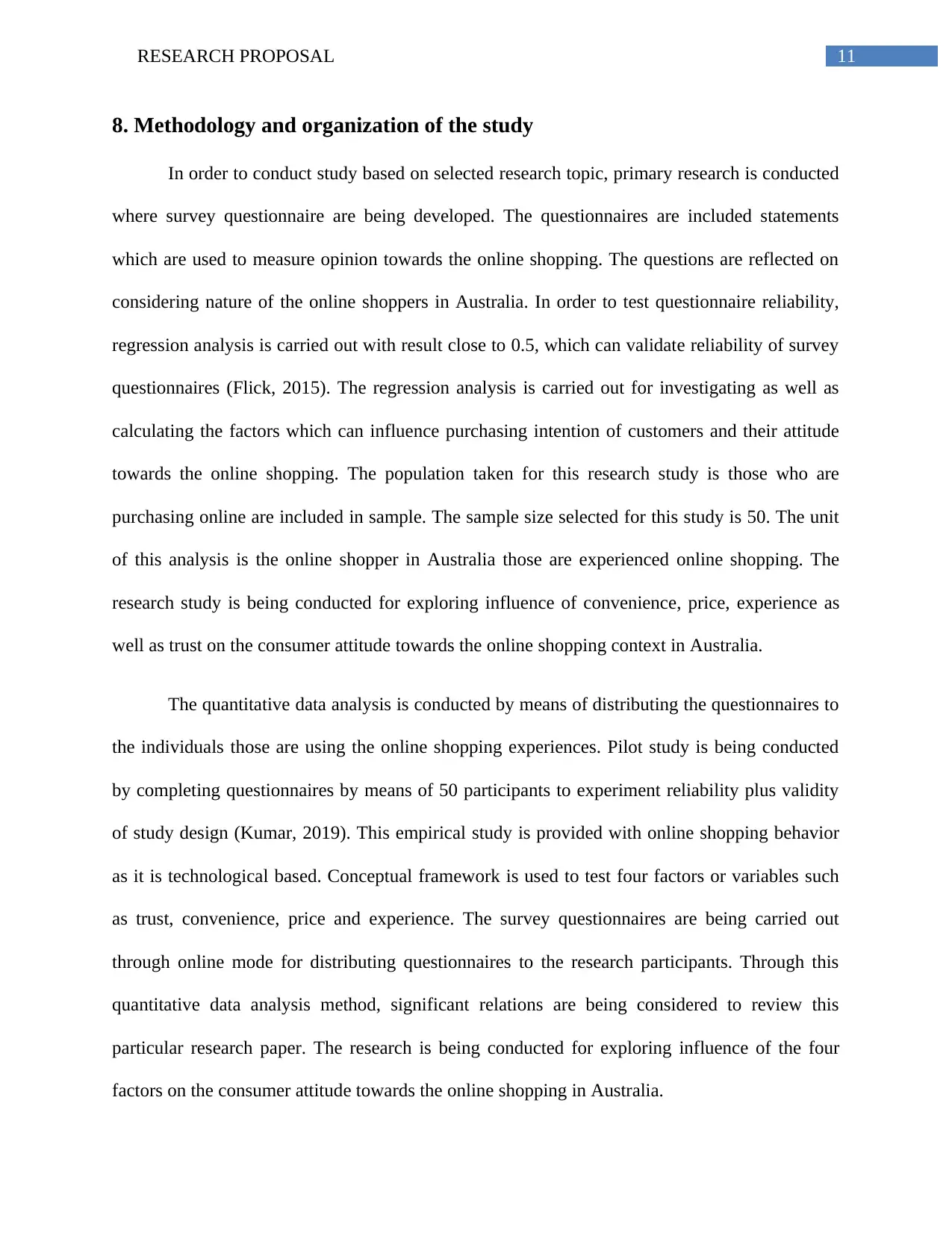
11RESEARCH PROPOSAL
8. Methodology and organization of the study
In order to conduct study based on selected research topic, primary research is conducted
where survey questionnaire are being developed. The questionnaires are included statements
which are used to measure opinion towards the online shopping. The questions are reflected on
considering nature of the online shoppers in Australia. In order to test questionnaire reliability,
regression analysis is carried out with result close to 0.5, which can validate reliability of survey
questionnaires (Flick, 2015). The regression analysis is carried out for investigating as well as
calculating the factors which can influence purchasing intention of customers and their attitude
towards the online shopping. The population taken for this research study is those who are
purchasing online are included in sample. The sample size selected for this study is 50. The unit
of this analysis is the online shopper in Australia those are experienced online shopping. The
research study is being conducted for exploring influence of convenience, price, experience as
well as trust on the consumer attitude towards the online shopping context in Australia.
The quantitative data analysis is conducted by means of distributing the questionnaires to
the individuals those are using the online shopping experiences. Pilot study is being conducted
by completing questionnaires by means of 50 participants to experiment reliability plus validity
of study design (Kumar, 2019). This empirical study is provided with online shopping behavior
as it is technological based. Conceptual framework is used to test four factors or variables such
as trust, convenience, price and experience. The survey questionnaires are being carried out
through online mode for distributing questionnaires to the research participants. Through this
quantitative data analysis method, significant relations are being considered to review this
particular research paper. The research is being conducted for exploring influence of the four
factors on the consumer attitude towards the online shopping in Australia.
8. Methodology and organization of the study
In order to conduct study based on selected research topic, primary research is conducted
where survey questionnaire are being developed. The questionnaires are included statements
which are used to measure opinion towards the online shopping. The questions are reflected on
considering nature of the online shoppers in Australia. In order to test questionnaire reliability,
regression analysis is carried out with result close to 0.5, which can validate reliability of survey
questionnaires (Flick, 2015). The regression analysis is carried out for investigating as well as
calculating the factors which can influence purchasing intention of customers and their attitude
towards the online shopping. The population taken for this research study is those who are
purchasing online are included in sample. The sample size selected for this study is 50. The unit
of this analysis is the online shopper in Australia those are experienced online shopping. The
research study is being conducted for exploring influence of convenience, price, experience as
well as trust on the consumer attitude towards the online shopping context in Australia.
The quantitative data analysis is conducted by means of distributing the questionnaires to
the individuals those are using the online shopping experiences. Pilot study is being conducted
by completing questionnaires by means of 50 participants to experiment reliability plus validity
of study design (Kumar, 2019). This empirical study is provided with online shopping behavior
as it is technological based. Conceptual framework is used to test four factors or variables such
as trust, convenience, price and experience. The survey questionnaires are being carried out
through online mode for distributing questionnaires to the research participants. Through this
quantitative data analysis method, significant relations are being considered to review this
particular research paper. The research is being conducted for exploring influence of the four
factors on the consumer attitude towards the online shopping in Australia.
⊘ This is a preview!⊘
Do you want full access?
Subscribe today to unlock all pages.

Trusted by 1+ million students worldwide
1 out of 20
Related Documents
Your All-in-One AI-Powered Toolkit for Academic Success.
+13062052269
info@desklib.com
Available 24*7 on WhatsApp / Email
![[object Object]](/_next/static/media/star-bottom.7253800d.svg)
Unlock your academic potential
Copyright © 2020–2026 A2Z Services. All Rights Reserved. Developed and managed by ZUCOL.




